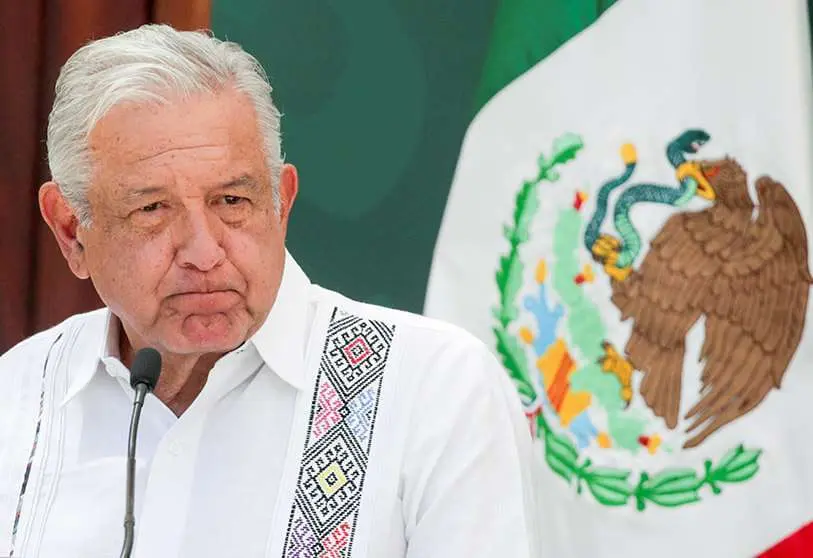Mexico from Spain's point of view

In Mexico, its president Andrés Manuel López Obrador denies acts of terrorism across the length and breadth of the Aztec geography and minimises the current barbarity to mere settling of scores between gangs. He omits between the lines that it is powerful drug cartels and other groups that have built up the crime industry as a modus vivendi.
The violent acts of recent days in western and northern Mexico have left scenes more akin to Ukraine's invasion at the hands of Russian troops and their consequent military defence. People are asking, at home and abroad, how far will terrorism go?
Installed in the National Palace since the beginning of his government in 2018 - according to him he applies an austere vision - he disdained to live in Los Pinos, the seat of the incumbent presidents who occupy the Presidency of the Republic. López Obrador opted for a monumental compound in an area of 40,000 square metres initially built by Hernán Cortés for private housing and which would later become the seat of the Viceroyalty.
There he lives with whispering ghosts that tell him all about what Mexico once was, what it wanted to be and could not be or simply will not let it be because its governments are going from bad to worse.
In the last few days, several civil groups and NGOs, with courageous independent social fighters who have lived through the pain of assassinations, incomprehensible disappearances and the brutal kidnappings of their loved ones, have written and signed a letter sent to the UN asking for the recognition of an internal armed conflict in Mexico with continued acts of terrorism.
The RAE defines terrorism as: "Serious crimes with the aim of subverting the constitutional order or suppressing or seriously destabilising the functioning of political institutions or the economic or social structures of the state or forcing the public authorities to carry out an act or to abstain from doing so; seriously disturbing the public peace, seriously destabilising the functioning of an international organisation or provoking a state of terror in the population or part of it".
More civilians are currently being killed in Mexico than in the war in Ukraine. The six-year term of López Obrador's administration is suffering from a complete lack of control in the areas of security and crime, and this is beginning to take its toll on the confidence levels for investment, business and the economy in the Aztec country.
Official figures of dubious credibility show 34,690 civilians killed in 2019, 34,554 homicides the following year and 33,315 murders in 2021.
Narcoterrorism is not an illusion as López Obrador defends from his palatial trench where every morning he gives a convoluted monologue to the media about rambling ideas and scathing criticisms of those who question him. A few days ago they buried the 12 year old boy Christian Omar Zúñiga Morales, shot by narco-terrorists in a grocery shop in Ciudad Juárez... the little boy was only accompanying his father in the shop where he worked.
In Spain, the course of presidential politics is worrying, it is well understood that one thing is business and the things of eating and another the internal vision that the president has had in his head, not now, but for decades, when he stopped being a member of the PRI and decided to become the number one saboteur of PEMEX with consistent social movements full of people he brought from his homeland of Tabasco to take over the Esplanade of the Zócalo for months on end. The same one he overlooks from his historic Palace balcony every morning.
The risk for Mexico is that it will also end up sabotaged by who decides what, how, how much and at what time it is governed or not and who is persecuted or not. It is necessary to take care of the health of foreign investment flows, which according to UNCTAD in 2018 when AMLO took office totalled 31,604 million dollars and in 2020 dropped to 27,934 million dollars and recovered again in 2021, with 31,621 million dollars.
With respect to Mexico, the two aspects that most concern Spain have to do with the direction of insecurity and crime; and López Obrador's decisions on Mexico's relationship with foreign capital: the United States (38.8%), Spain (13.1%), Canada (10.1%) and Germany (8.2%) are the countries that invest the most in Mexico, but the influence is changing.
López Obrador has never been interested in learning English; his anti-American vision is pragmatic and if it were up to him he would have already broken the T-MEC and even relations with Spain, which he considers a subjugating and arrogant nation incapable of asking for forgiveness. However, he does not deny living in the palace built by the Spaniard Cortés.
Throughout his government, fewer and fewer works have been awarded to Spanish or American companies, which, curiously enough, are winning fewer and fewer tenders, while Chinese companies are winning them.
While for decades the Canadian company Bombardier or the Spanish company Construcción y Auxiliar de Ferrocarriles (CAF) have traditionally participated in the construction of the Metro in Mexico with a series of supplies, including trains, under López Obrador it is the Chinese who are winning the agreements in this area: the renovation of Line 1 of the Mexico City Metro will be in the hands of the company CRRC Zhuzhou Locomotive with an order for 29 trains. For Mexico, the most complicated months will come because in 2023 the de facto presidential race will begin in search of AMLO's possible successors in 2024... the final stretch is when the most damage tends to be done because decisions are made to lengthen the shadow in the exercise of power, especially if leaving the presidency causes insomnia.

